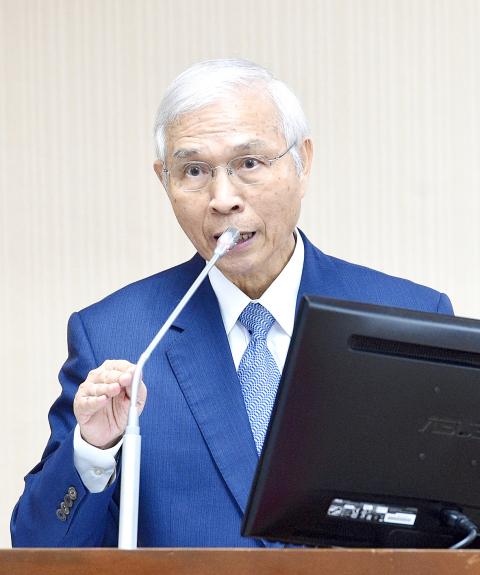Central bank Governor Yang Chin-long (楊金龍) yesterday voiced concern that the US might again place Taiwan on its currency watch list, as the nation is falling short of Washington’s standards amid the effects of the US-China trade dispute.
The US Department of the Treasury is to update its semi-annual currency-monitoring list this month and in April next year.
The measures it uses to back currency manipulation charges include a trade surplus of more than US$20 billion, a current-account surplus in excess of 3 percent of GDP and unilateral interventions in currency markets that exceed 2 percent of GDP, Yang said.

Photo: Taipei Times
Taiwan is approaching the first two thresholds, with Taiwanese firms benefiting from shifts in electronics supply chains as businesses respond to tariffs imposed by Washington on Chinese goods, Yang told the Legislative Yuan’s Finance Committee in Taipei.
The trend might deepen if the trade issues escalate further, which would make additional facility relocations and order transfers inevitable, Yang said.
Taiwan had a trade surplus for the year to August of US$29.47 billion, with exports to the US rising 18.7 percent to US$30.2 billion from the same period last year, despite a slowdown in global trade, Ministry of Finance statistics showed.
Major tech firms have shifted production lines home from China, especially those that provide shipments to the US.
Taiwan could be a winner and a victim of trade frictions after registering a US$16 billion trade surplus with the US in the first half of this year, former premier Sean Chen said, citing US government data.
The trade figures might see Taiwan labeled a currency manipulator and punitive tariffs imposed on exports to the US, Chen said.
Yang said that the nation could make the watch list if it fails two tests and labeled a manipulator if it fails all three.
The central bank has kept a balanced current account as of September last year, despite efforts to help stabilize the New Taiwan dollar, Yang said.
“The central bank was a net buyer [of the NT dollar] in May and a seller in June,” Yang told lawmakers without elaborating.
The US put Taiwan on the watch list in 2016 and early 2017, saying that the central bank repeatedly intervened in the foreign-exchange market to support Taiwan’s exports by stopping the local currency from appreciating.
Authorities would pay close attention to the issue and bilateral communications are smooth, Yang said.
Meanwhile, the central bank said that there is no need to cut the interest rate, despite peers worldwide leaning on monetary easing to cope with a global slowdown, with two more rate cuts expected by the US Federal Reserve this year, Yang said.
It is inappropriate for US President Donald Trump to demand rate cuts given the Fed’s independent operations, he said.

EUROPEAN TARGETS: The planned Munich center would support TSMC’s European customers to design high-performance, energy-efficient chips, an executive said Taiwan Semiconductor Manufacturing Co (TSMC, 台積電), the world’s largest contract chipmaker, yesterday said that it plans to launch a new research-and-development (R&D) center in Munich, Germany, next quarter to assist customers with chip design. TSMC Europe president Paul de Bot made the announcement during a technology symposium in Amsterdam on Tuesday, the chipmaker said. The new Munich center would be the firm’s first chip designing center in Europe, it said. The chipmaker has set up a major R&D center at its base of operations in Hsinchu and plans to create a new one in the US to provide services for major US customers,

The Ministry of Transportation and Communications yesterday said that it would redesign the written portion of the driver’s license exam to make it more rigorous. “We hope that the exam can assess drivers’ understanding of traffic rules, particularly those who take the driver’s license test for the first time. In the past, drivers only needed to cram a book of test questions to pass the written exam,” Minister of Transportation and Communications Chen Shih-kai (陳世凱) told a news conference at the Taoyuan Motor Vehicle Office. “In the future, they would not be able to pass the test unless they study traffic regulations

GAINING STEAM: The scheme initially failed to gather much attention, with only 188 cards issued in its first year, but gained popularity amid the COVID-19 pandemic Applications for the Employment Gold Card have increased in the past few years, with the card having been issued to a total of 13,191 people from 101 countries since its introduction in 2018, the National Development Council (NDC) said yesterday. Those who have received the card have included celebrities, such as former NBA star Dwight Howard and Australian-South Korean cheerleader Dahye Lee, the NDC said. The four-in-one Employment Gold Card combines a work permit, resident visa, Alien Resident Certificate (ARC) and re-entry permit. It was first introduced in February 2018 through the Act Governing Recruitment and Employment of Foreign Professionals (外國專業人才延攬及雇用法),

‘A SURVIVAL QUESTION’: US officials have been urging the opposition KMT and TPP not to block defense spending, especially the special defense budget, an official said The US plans to ramp up weapons sales to Taiwan to a level exceeding US President Donald Trump’s first term as part of an effort to deter China as it intensifies military pressure on the nation, two US officials said on condition of anonymity. If US arms sales do accelerate, it could ease worries about the extent of Trump’s commitment to Taiwan. It would also add new friction to the tense US-China relationship. The officials said they expect US approvals for weapons sales to Taiwan over the next four years to surpass those in Trump’s first term, with one of them saying